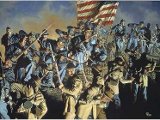American Revolution Dates

Causes, course and significance of the American Revolution cannot be explained by dates and events alone. The following American Revolution dates relate only to the most important events in the American struggle for independence.
March 22, 1765 – The British Parliament passed the Stamp Act requiring from every printed material including newspapers, pamphlets, almanacs, broadsides and other commercial and legal documents to bear revenue stamps. The aim of the tax was to help pay for the British troops in the colonies as well as to reduce the British debt which nearly doubled during the French and Indian Wars (1754-1763). The first direct tax on colonies caused an outrage among the colonists, while the colonial merchants organized an economic boycott forcing Britain to repeal the Stamp Act in 1766.
June 15 – July 2, 1767 – The British Parliament passed the so-called Townshend Acts, a series of laws which among other imposed duties on imported tea, paper, paint, glass and lead provoking a second wave of protests in the colonies.
March 5, 1770 – The British soldiers opened fire on an angry crowd in Boston killing five men. The incident, known as the Boston Massacre and the bitter opposition to the Townshend Acts forced Britain to repeal all duties except the one on tea.
December 16, 1773 – A group of men disguised as Native Americans boarded on three British ships in Boston harbor and threw the tea cargo of the British East India Company into the sea. The event that came to be known as the Boston Tea Party initiated a chain of reactions which directly led to the American Revolutionary War.
March 30 – June 22, 1774 – The British Parliament, angered by the Boston Tea Party passed a series of laws that came to be known as Coercive Acts or Intolerable Acts. They closed the Boston harbor for all shipping until paying for the destroyed tea, placed the Massachusetts government under the British control, allowed trials to the British officials to be transferred to other colonies and England, and allowed the housing of the British troops in private buildings. The Quebec Act passed on June 22 was not meant as a punitive act but it was perceived as such. It extended the boundaries of the Province of Quebec to the Ohio River, introduced reforms that favored the French Catholic colonists and established the French civil law that based on trials without jury.
September 5, 1774 – The delegates from 12 colonies (Georgia did not send representatives) convened the (First) Continental Congress which called for the boycott of British goods. It also established the Continental Association to implement the boycott with an aim to force Britain to repeal the Coercive Acts.
April 19, 1775 – The Battles of Lexington and Concord marked the beginning of the American Revolutionary War.
May 10, 1775 – The representatives of all 13 colonies met at the Second Continental Congress in Philadelphia and voted to go to war against Great Britain.
June 15, 1775 – The Second Continental Congress appointed George Washington as Commander-in-Chief of the newly created Continental Army.
July 14, 1776 – The Second Continental Congress adopted the Declaration of Independence which proclaimed independence of the 13 colonies.
September 19 and October 7, 1777 – The Battles of Saratonga marked the turning point of the American Revolutionary War. The failure of the British offensive turned the war in favor of the American forces and encouraged France to support the American cause.
November 15, 1777 – The Second Continental Congress adopted the Articles of Confederation, the first constitution of the United States.
October 19, 1781 – The Surrender of Yorktown de facto ended the American Revolutionary War. Military operations continued but the surrender of Charles Cornwallis at Yorktown prompted Great Britain to enter peace negotiations in early 1782.
September 3, 1783 – The Treaty of Paris officially ended the American Revolutionary War and recognized independence of the United States of America.




